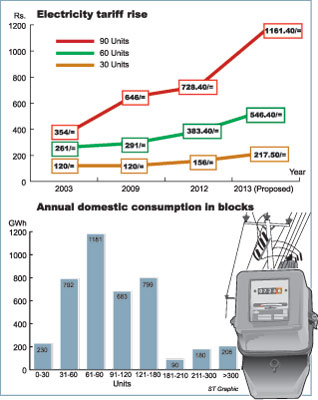News
Consumers throw light on CEB, oppose tariff hikes
View(s):Public representatives, stakeholders call for management reforms at Board
By Chamal Weerakkody
Public representatives have expressed displeasure over the proposed electricity tariff increase and joined the power-sector stakeholders in calling for more transparency in contracts, tenders and other financial dealings of the Ceylon Electricity Board (CEB).
Their call for reforms came during oral submissions to the Public Utilities Commission (PUC) which is tasked to review proposals and revise tariff rates. The new rates are likely to be announced soon after the National New Year.

The CEB has petitioned the commission, seeking a tariff increase to overcome losses amounting to more than Rs. 80 billion – losses that were incurred, according to stakeholders, due to mismanagement. Public representatives, who attended the commission’s sittings held at the Sri Lanka Institute of Development Administration auditorium on Thursday, said they opposed the CEB’s tariff hike proposal as it would hit the poorest segment of society the hardes.
According to a research conducted by the commission and the Colombo University, some 42 per cent of electricity consumers in Sri Lanka use less than the average household electricity consumption a month. A public representative claimed that the top ten percent of high users consumed 29 units per person a month while the lowest 10 per cent consumed 10 units per person a month.
Prof. Rohan Samarajiva from LIRNEasia, an information technology think-tank, said the methodology employed by the CEB to work out its tariff proposal was ambiguous and lacked transparency with regard to cost estimates. He pointed out that across-the-board high tariffs would affect the growth of the industrial sector and discourage investment. He also called on the authorities to provide more subsidies to the poorer segments of society and charge high electricity consumers more.
Well-known energy expert Thilak Siyambalapitiya said the CEB had violated the policy and the principles of the institution when preparing its proposals. He charged that the CEB had resorted to inaccurate or questionable methodologies to deceive the general public and other electricity users.
He also claimed that CEB accounts should be revised since certain losses amounting to more than Rs. 13 billion had never been accounted for.
Lanka Sama Samaja Party representative Keerthi Kariyawasam said the second and third phases of the Norochcholai coal-power plant should be started and small-scale power plants set up in rural areas to meet the high demand for electricity. He said the burden of subsidies offered to religious and charitable organisations should not be placed on the general public and called for a mechanism to create a win-win situation for both.
Charging that the CEB lacked transparency, Mr. Kariyawasam called for the standardisation of the institute to address questions over mismanagement. Tissa de Silva, Secretary of the Peoples Policy Institute, said the adoption of the ‘Time-of-day’ tariff system – a system by which the consumers will be charged different rates for peak hours and off-peak hours—would be beneficial to the public as it would help them use less electricity during peak hours. Reducing 5 per cent of electricity consumption during peak hours could lead to a 50 per cent reduction in the monthly bill.
He said a tariff hike would hit the working women the hardest and it might even infringe on their fundamental rights as they had to depend on electric equipment to do their daily chores.
B.A.C.M. Rameem, a resident of Akurana, said state-sector institutes that waste electricity should be penalised. He said that in some state-sector offices, employees failed to switch off lights and fans before they left for home. It was the state-sector that wasted electricity but the burden was being put on an already-overburdened public, he said.
Piyatissa Padukka from Idangoda, Ratnapura said local councils should be made to pay for the subsidy given to light up streets or the authorities should adopt solar-energy method to light street lamps.
Though the public representatives opposed the CEB’s price hike proposal, private sector power suppliers saw some justification in it. An official of the Small Hydro Power Developers Association agreed with the increase although he questioned the mechanism of the proposed tariff.
He said the CEB’s losses needed to be offset through a price increase. He said the high cost of electricity generation was largely due to the overdependence on thermal power, the production cost of which rose by at least 20 per cent a year due to coal and fuel increases and by another 7-8 per cent due to the depreciation of the rupee.
PUC Director General Damitha Kumarasinghe told the Sunday Times the commission was analysing both the written and verbal submissions and would come up with a formula acceptable to all stakeholders. He added that the opinions expressed at the sittings and the government policy would be taken into consideration in determining the final end-user tariffs
Follow @timesonlinelk
comments powered by Disqus

















